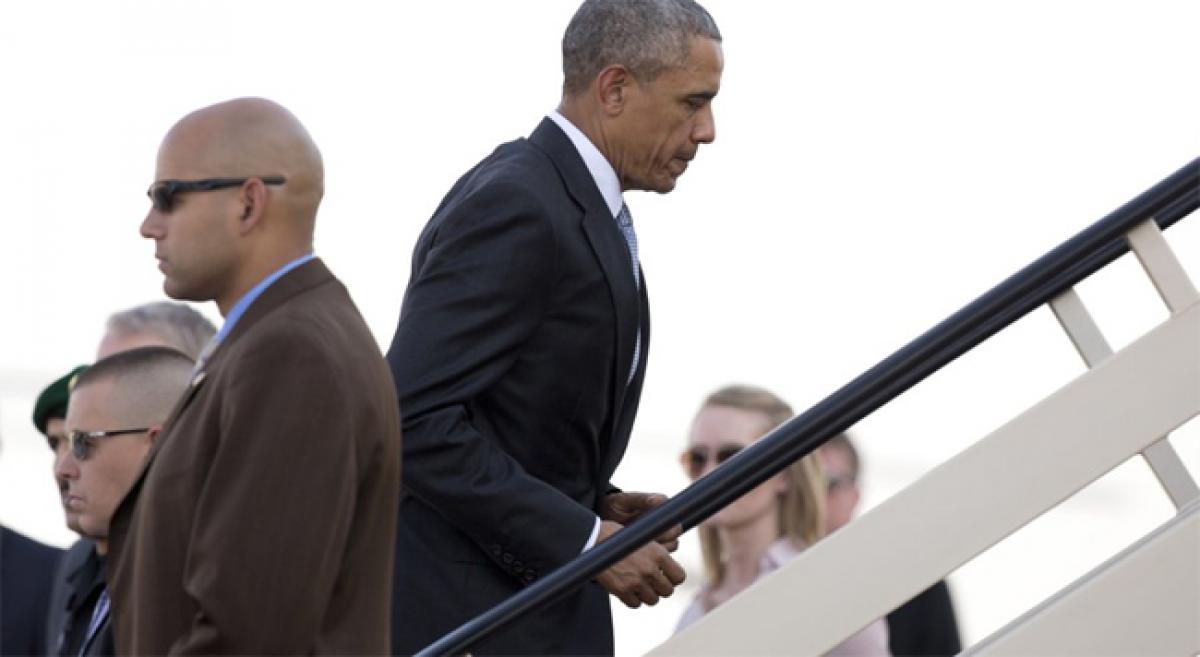Live
- ‘Get Set, Grow Summit 2024’ Focuses on Digital Detox for Families
- Stokes motivates his team to put in extra effort, says England pacer Potts
- From overcoming setbacks to leading India in U19 Women’s Asia Cup, Niki Prasad's amazing journey
- Driving Enterprise Security: Inside Venkata Reddy Thummala’s Leadership Journey
- Constitution debate: PM Modi hails 'Nari Shakti'; makes strong pitch for 'United Bharat’
- Abhijeet Bhardwaj: Revolutionizing Enterprise Analytics with Innovation and Expertise
- Bihar: Inquiry initiated against principal who went to buy veggies during school hours
- Press Sri Lankan Prez for release of Indian fishermen: TN Cong MP to EAM Jaishankar
- TN: DMK postpones executive meet due to heavy rains & Parliament session
- Porous silicon oxide electrodes can fix durability issues in batteries: Researchers
Just In

US President Barack Obama met on Thursday in Riyadh with leaders of the Gulf Cooperation Council (GCC) states to mend strained ties, with no major announcements coming out of the summit.
US President Barack Obama met on Thursday in Riyadh with leaders of the Gulf Cooperation Council (GCC) states to mend strained ties, with no major announcements coming out of the summit.
Obama pledged to remain vigilant against Iran's destabilizing activities in the Middle East, as he tried to comfort his Gulf allies after bilateral relations were strained by the nuclear deal reached with Iran last year.
"When we entered into negotiations with Iran on the nuclear deal, there was concern that in the interest of getting a deal done we would somehow look the other way with respect to other destabilizing activities," Obama said in the Saudi capital in a brief press conference after meeting with leaders of the GCC countries.
The GCC comprises Bahrain, Kuwait, Oman, Qatar, Saudi Arabia and the United Arab Emirates.
In April 2015, Iran and six world powers, including the United States, Russia, China, Britain, France and Germany, reached an initial agreement to limit Iran's nuclear activities for a specific period in return for relieving the economic sanctions imposed on Iran over its nuclear program.
The US president said the deal has "cut off every single one of Iran's pathways to a nuclear weapon," but his country continues to have "serious concerns" about Iran's behaviour in the region.
A day earlier, the GCC defence ministers and their U.S. counterpart, Ashton Carter, discussed in Riyadh military cooperation and the latest developments in the Middle East, agreeing to carry out joint patrols to stop any Iranian arms shipments reaching Yemen.
The Persian Gulf nations, Saudi Arabia in particular, have repeatedly raised concerns that the nuclear deal reached with Iran last year will further empower the Islamic Republic to interfere in Arab affairs.
The tensions between Iran and the Gulf nations reached a new high in January when Riyadh and a number of its Sunni Arab allies cut diplomatic ties with Tehran, after mobs ransacked the Saudi embassy in response to the execution of a prominent Shiite cleric in Saudi Arabia.
At the summit, Obama and the GCC leaders also committed to urgently undertake steps to intensify the campaign to defeat the Islamic State militant group and the Al-Qaeda, and reduce regional and sectarian tensions that fuel instability, said a White House statement.
It is Obama's fourth visit to the oil-rich Gulf nation, one of Washington's most strategic allies in the Middle East, since taking office in 2009.
"Oil is the basis for the whole issue, as oil is so essential for the United States," Hani Khallaf, political expert and Egypt's former assistant foreign minister for Arab affairs told Xinhua.
"The US-Gulf ties allowed Washington to establish large military bases in the region," which is a great advantage for the Americans too," Khallaf stressed.
However, no major announcements came out of the summit as Obama is already a lame-duck president, said Saeed al-Lawindi, political researcher and expert of international relations at Cairo-based Al-Ahram Centre for Political and Strategic Studies.
"Obama's visit to Saudi Arabia is for reassurance about Iran in the first place, yet his administration is going through a 'lame duck' stage, and so it cannot make a significant change in the US policy in the Arab world," said al-Lawindi.
The summit came on the heels of Obama's criticism of Saudi Arabia's regional role, which prompted a strong rebuke from the Saudi royal family.
In a recent interview with The Atlantic, Obama described Saudi Arabia and other allies as "free riders" on US foreign policy, and criticized what he saw as Riyadh's funding of religious intolerance.
Almost a year ago, in May 2015, Obama hosted leaders of Gulf nations at the White House and the Camp David retreat, the first meeting of the Gulf countries after a framework agreement on limiting Iran's nuclear program.
Except for Kuwait and Qatar, top leaders from four of the six-member GCC countries were absent from the 2015 summit.

© 2024 Hyderabad Media House Limited/The Hans India. All rights reserved. Powered by hocalwire.com







